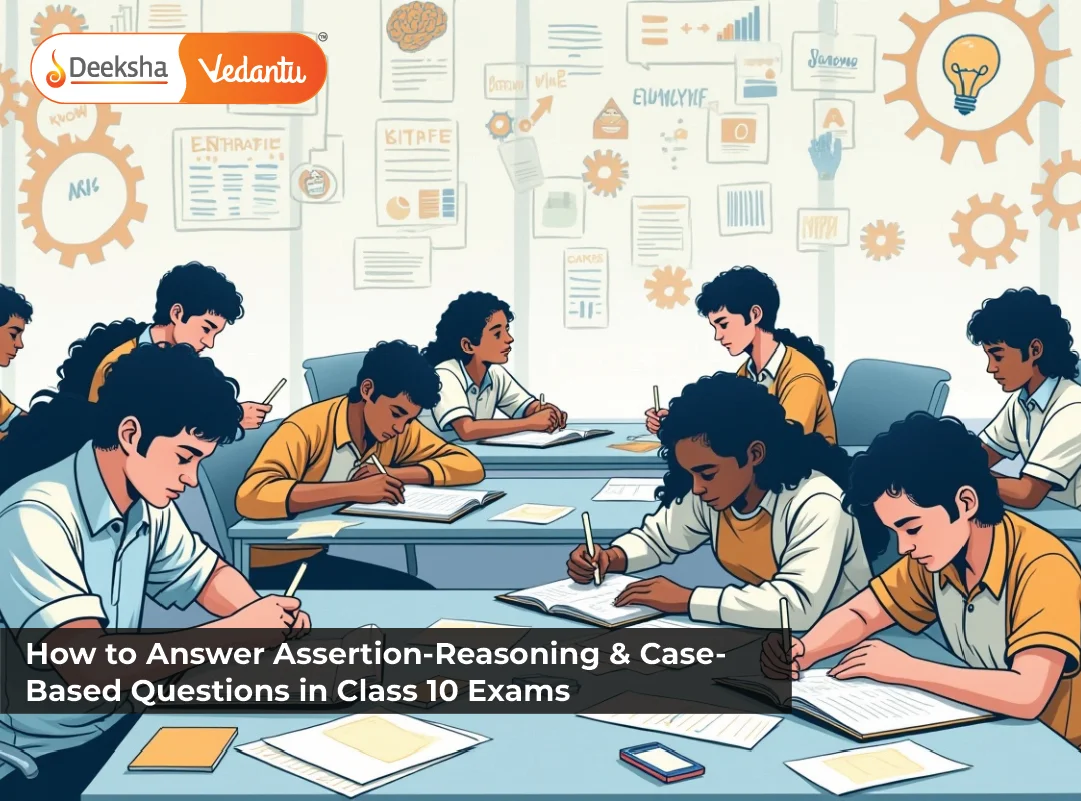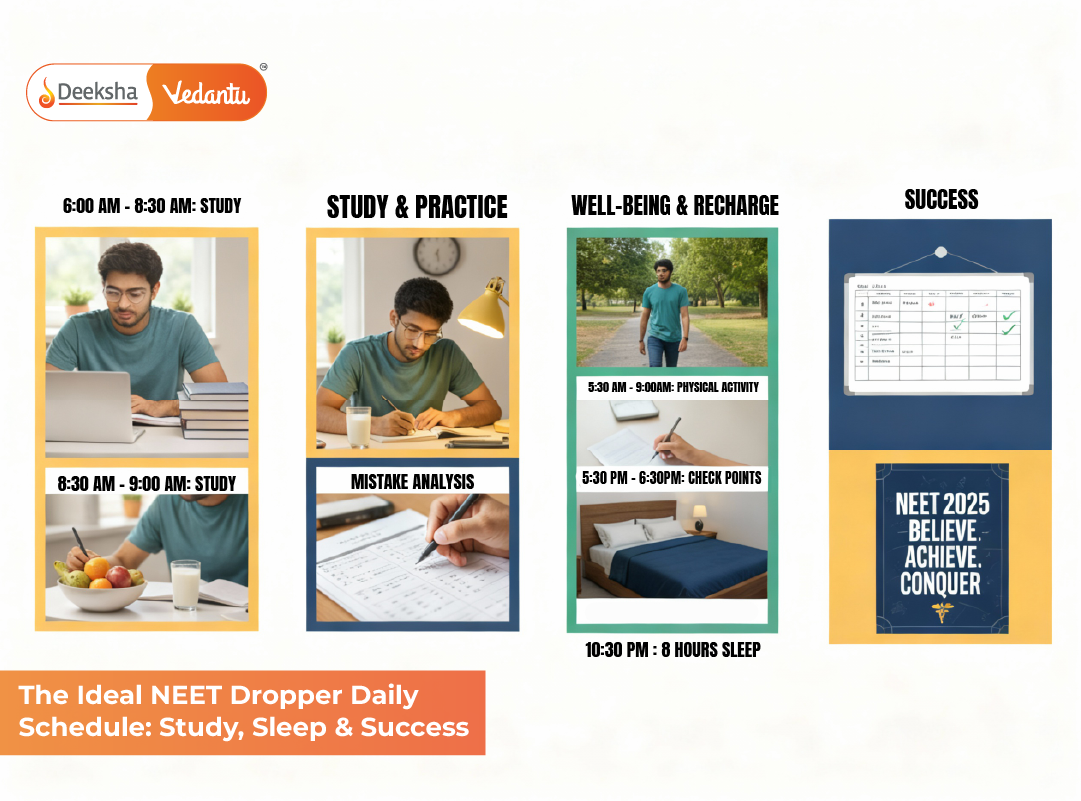Introduction
Assertion-reasoning and case-based questions are a common feature in the Class 10 exams and are designed to test not only your knowledge but also your ability to think critically and apply concepts to real-world scenarios. These question types require students to analyze statements carefully, understand the relationships between them, and select the correct answer based on logical reasoning.
While they may seem tricky at first, with the right approach, you can easily master these questions and improve your exam performance. In this blog, we’ll guide you through effective strategies to tackle assertion-reasoning and case-based questions, common mistakes to avoid, and tips on how to practice efficiently. At Deeksha Vedantu, we ensure that students are well-prepared to approach these questions confidently and accurately, leading to higher scores in their Class 10 exams.
Why Assertion-Reasoning & Case-Based Questions Matter
Assertion-reasoning and case-based questions are designed to test your understanding of concepts, your analytical thinking, and your ability to apply theoretical knowledge in practical situations. They are an essential part of the Class 10 exams for several reasons:
1. The Significance of These Question Types in Class 10 Exams
These question types are often included in subjects like Science, Social Science, and Mathematics. They require students to not only recall facts but also understand the logic behind the concepts and analyze them in the given context. In the SSLC exams, assertion-reasoning and case-based questions carry significant weight, making them essential to your overall score.
2. How These Questions Test Critical Thinking and Concept Application
Unlike simple multiple-choice or direct-answer questions, assertion-reasoning and case-based questions require students to think critically. You must evaluate whether the statement is correct, justify the reasoning behind it, and choose the best answer based on your understanding of the topic. This tests your ability to apply theoretical knowledge to real-life scenarios.
3. The Weightage of Assertion-Reasoning and Case-Based Questions in the Overall Exam
Typically, these types of questions are assigned a decent weightage in the exam. Their importance lies not only in their ability to test the depth of your understanding but also in their contribution to higher-order thinking skills, which are highly valued in the Class 10 assessment. In subjects like Science and Social Science, these questions help demonstrate a student’s ability to link facts, concepts, and scenarios.
Understanding Assertion-Reasoning Questions
Assertion-reasoning questions are designed to test your ability to critically evaluate statements and determine the relationship between them. These questions are common in subjects like Science, Social Science, and Mathematics. Let’s break down how to approach these questions effectively:
What Are Assertion-Reasoning Questions?
Assertion-reasoning questions consist of two parts: the assertion and the reasoning. The assertion is a statement that you need to evaluate, while the reasoning explains why the assertion might be true or false. Your job is to determine whether both the assertion and reasoning are true, and whether the reasoning correctly explains the assertion.
- Assertion: A statement related to the subject matter that may or may not be true.
- Reasoning: An explanation that supports the assertion and helps determine its validity.
Difference Between Assertion-Reasoning and Multiple-Choice Questions
While both types of questions test your understanding, assertion-reasoning questions require deeper analysis. Unlike multiple-choice questions (MCQs) where you select an answer from options, assertion-reasoning questions demand that you analyze the truthfulness of both the assertion and reasoning, and then evaluate whether they are connected.
For example:
- Assertion: “Water boils at 100°C at sea level.”
- Reasoning: “The boiling point of water decreases as altitude increases.”
In this case, you have to evaluate whether both statements are true and if the reasoning correctly explains the assertion.
How to Approach Assertion-Reasoning Questions
Follow these steps to ensure you approach assertion-reasoning questions effectively:
- Evaluate the Assertion Independently:
The first step is to check whether the assertion is true or false based on your knowledge. Don’t rely on the reasoning at this stage — focus on verifying the assertion alone. - Evaluate the Reasoning Independently:
After determining whether the assertion is true or false, move on to the reasoning. Check if the reasoning is logically sound and correct, and whether it provides a valid explanation for the assertion. - Determine the Relationship Between Assertion and Reasoning:
Once both parts are evaluated, determine if the reasoning supports the assertion. There are four possible outcomes for these questions:- Both assertion and reasoning are true, and the reasoning explains the assertion (correct answer).
- Both assertion and reasoning are true, but the reasoning does not explain the assertion (incorrect answer).
- Assertion is true, but reasoning is false (incorrect answer).
- Assertion is false, but reasoning is true (incorrect answer).
- Choose the Correct Answer:
Based on your evaluation, choose the appropriate answer from the options provided. Most often, the answer choices will include options like:- Both assertion and reasoning are correct, and reasoning explains assertion.
- Both assertion and reasoning are correct, but reasoning does not explain assertion.
- Assertion is correct, but reasoning is incorrect.
- Assertion is incorrect, but reasoning is correct.
Strategies for Case-Based Questions
Case-based questions are designed to assess your ability to apply theoretical knowledge to real-life or practical situations. These questions usually come with a scenario or situation, followed by a set of questions. Let’s look at how to approach case-based questions effectively.
1. Understanding Case-Based Questions
Case-based questions typically involve a short passage or scenario followed by one or more questions related to the situation. These questions test not only your knowledge of concepts but also your ability to interpret information, analyze situations, and apply what you’ve learned to solve problems.
- Example: You may be given a scenario about a chemical reaction and asked to explain the process based on your knowledge of the topic.
2. Key Steps to Tackle Case-Based Questions
Step 1: Read the Case Carefully
The first step is to carefully read the case or scenario provided. Make sure to understand the situation fully before jumping to the questions. Pay attention to key details such as numbers, locations, or conditions mentioned in the case, as these will often guide your answers.
Step 2: Identify Key Concepts or Theories
Once you have read the case, identify the concepts, theories, or laws that apply to the situation. This will help you determine what knowledge is needed to answer the questions. For example, if the case is about the effects of temperature on a chemical reaction, the relevant concepts would be related to the collision theory or the law of mass action.
Step 3: Link the Case Details to Theoretical Knowledge
Connect the details from the case with the theoretical knowledge you have learned. For example, if a question asks you to explain a phenomenon based on the case, recall the relevant concepts and explain how they fit the situation described.
Step 4: Answer the Questions Based on the Given Information
Now that you have a clear understanding of the case and how it relates to theoretical knowledge, proceed to answer the questions. Make sure to base your answers on the information provided in the case, rather than making assumptions. Use specific details from the case to support your answers.
3. Practice Techniques for Case-Based Questions
Solve Previous Years’ Case-Based Questions
One of the best ways to prepare for case-based questions is to practice solving past exam papers. By solving previous years’ case-based questions, you’ll get a feel for how these questions are framed and how to approach them efficiently.
Use Real-Life Examples to Enhance Understanding
When studying, try to relate the concepts you learn to real-life situations or scenarios. This will improve your ability to apply theoretical knowledge to practical problems and make it easier to tackle case-based questions in the exam.
Group Discussions and Study Sessions
Engage in group discussions or study sessions to share your understanding of different concepts. Explaining theories and discussing how they apply to real-world cases will strengthen your grasp on the subject and prepare you for case-based questions.
Common Mistakes to Avoid in Assertion-Reasoning & Case-Based Questions
While answering assertion-reasoning and case-based questions, students often make mistakes that can cost them marks. Being aware of these mistakes will help you avoid them and approach these questions more confidently during the exam. Let’s look at some common pitfalls and how to avoid them:
1. Skipping Important Details in Case Scenarios
In case-based questions, students sometimes skip over critical details in the case scenario, which can lead to incomplete or incorrect answers. These details often provide key insights that are necessary for answering the questions correctly.
- Tip: Carefully read the entire case scenario before jumping to the questions. Underline or highlight key details and make sure you address all aspects of the case in your answers.
2. Jumping to Conclusions Without Fully Analyzing the Assertion and Reasoning
In assertion-reasoning questions, students often jump to conclusions without fully analyzing whether the assertion is true or false and if the reasoning correctly explains the assertion. This can lead to incorrect answers.
- Tip: Break down both the assertion and reasoning before answering. Check if they are both true or false, and determine whether the reasoning supports the assertion.
3. Not Connecting Case Information to Theory
Case-based questions require you to apply theoretical knowledge to practical situations. Some students fail to make the connection between the case details and the theoretical concepts they’ve learned, leading to incomplete or vague answers.
- Tip: Always relate the case information to the theoretical concepts. Identify the core concept that applies to the situation and use it to explain or solve the problem in the case.
4. Overcomplicating Answers
Sometimes, students overcomplicate their answers, especially in case-based questions, by adding irrelevant information or writing overly lengthy responses. This can lead to confusion and unnecessary errors.
- Tip: Keep your answers clear, concise, and to the point. Stick to the question, and focus on answering based on the information provided.
5. Ignoring Time Management
In exams, students often spend too much time on assertion-reasoning or case-based questions, leaving little time for other sections. This can affect their overall performance.
- Tip: Practice time management during mock exams. Allocate a specific amount of time to each question type and try to stick to it. If you’re stuck on one question, move on and return to it later if time allows.
FAQs
1. How do I identify whether the assertion and reasoning are true or false?
To identify whether the assertion and reasoning are true or false, first analyze them separately. For the assertion, recall the relevant facts or concepts to determine its accuracy. Similarly, for reasoning, check whether the explanation provided logically supports the assertion. Ensure both parts are independently true or false before determining their relationship.
2. What’s the best approach for answering case-based questions?
The best approach for case-based questions is to read the scenario carefully and underline key points. Identify the relevant concepts or theories that apply to the case. Use these concepts to frame your answers, ensuring your response is rooted in the information provided in the case. Avoid assumptions and rely solely on the details in the scenario.
3. Are assertion-reasoning questions more difficult than other question types?
Assertion-reasoning questions can be challenging because they test both your knowledge and your ability to reason logically. However, with regular practice and a clear understanding of how to evaluate the relationship between assertion and reasoning, these questions become easier to tackle.
4. How can I practice case-based questions effectively?
To practice case-based questions effectively, solve past exam papers and engage in scenario-based problem-solving exercises. Try to relate theoretical concepts to real-world situations to improve your ability to answer case-based questions in exams. Regular practice helps build the critical thinking required for these questions.
5. How can I improve my critical thinking for assertion-reasoning questions?
Improving your critical thinking involves regularly practicing assertion-reasoning questions and developing the ability to analyze statements logically. Focus on understanding the core concepts and practice evaluating the relationship between assertions and reasoning. Discussions and debates on various topics can also help sharpen your analytical skills.
Conclusion: Mastering Assertion-Reasoning & Case-Based Questions for Class 10 Exams
Assertion-reasoning and case-based questions are excellent ways for examiners to assess your ability to apply theoretical knowledge to real-life situations. By following the right strategies, you can tackle these questions confidently and effectively. Remember, these questions test your critical thinking, understanding of concepts, and your ability to analyze and connect information — skills that are essential not only for exams but for real-world problem-solving as well.
At Deeksha Vedantu, we provide students with regular practice, mock exams, and personalized feedback to master assertion-reasoning and case-based questions. With the right preparation and focus, you’ll be well-equipped to excel in the Class 10 exams and achieve your desired results.
Stay confident, practice consistently, and approach these questions with clarity — the high scores are within your reach!
Table of Contents










Get Social